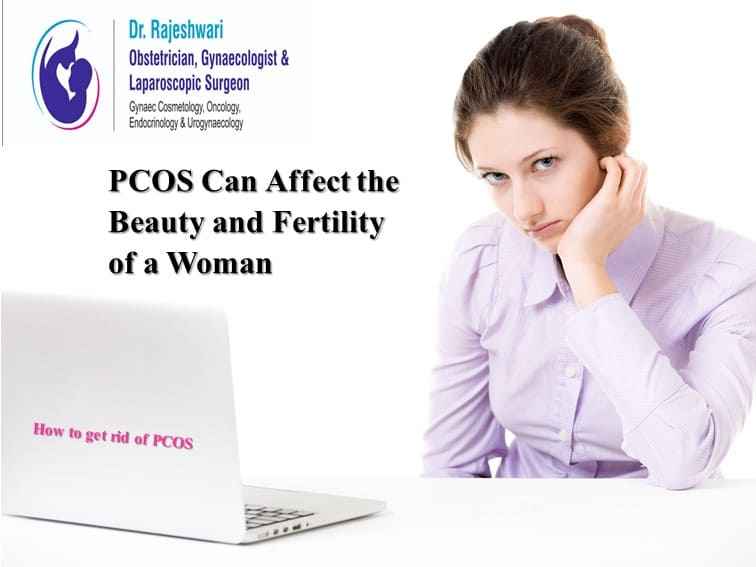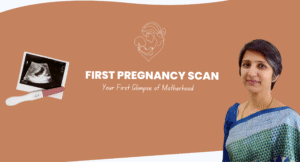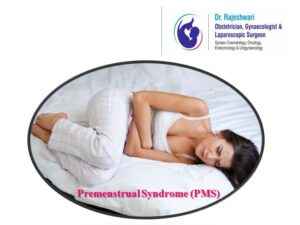Polycystic ovarian syndrome (PCOS) is one condition that very much affects a woman’s aesthetics (appearance/looks), menstrual cycle and hormones to a larger extent – apart from making her infertile and affecting her emotionally. Almost 20% (1 in 5) Indian women suffer from this problem and the percentage of PCOS cases seems to be more in the north Indian states. The situation is alarming as even young women are having this problem all over India. If we go by these numbers, PCOS is one of the major causes of infertility in Indian women. In general, PCOS is the most common cause of infertility in many women across the world. It can develop as early as the first menstrual period or sometimes later in life as well. Mostly, this condition affects women of reproductive age.
In a normal woman, every month 4-5 follicles are recruited in one ovary from the pool of eggs and one of the follicles becomes dominant follicle and releases an egg (ovulation). In a woman with PCOS, ovaries produce excess male hormones– due to which follicles do not open and don’t release eggs. When this happens, periods become irregular or absent altogether. The follicles remain in the ovaries as cysts, making it increasingly difficult (but not impossible) to conceive.
Read – How to get pregnant with PCOS
When follicles do not release an egg, ovulation does not take place and multiple follicles are present in ovaries. Each follicle is around 8-12 mm in size. Hence, the name polycystic ovaries is derived. Many women with PCOS are asymptomatic as well.
PCOS in a Nutshell
The lack of ovulation alters levels of estrogen, progesterone, FSH, and LH. A woman with PCOS, in general, has excess male hormones or androgens, lack of ovulation, menstrual abnormalities, unwanted hair, insulin resistance (elevated blood glucose levels), obesity and infertility issues.
PCOS Affects Fertility
The major problem with Polycystic ovarian syndrome is that it disrupts normal hormonal balance and the pathways that are involved in egg production and release which makes uterus ready for pregnancy. Getting pregnant and sustaining pregnancy is a big problem for women with PCOS, due to the following reasons – the absence of ovulation, absence of periods or irregular periods and the lack of preparedness of the endometrium to sustain the pregnancy.
Signs and Symptoms of PCOS
In pubertal girls, the symptoms begin shortly after puberty or may develop during teen years or early adolescence. In these cases, symptoms may either go unnoticed or are attributed to other causes. In some cases, PCOS can go unnoticed or undiagnosed for some time – especially when the symptoms are not prominent.
The most common signs and symptoms of PCOS include:
- Infrequent, prolonged or irregular menstrual cycles
- Excess facial and body hair (hirsutism) due to excess male hormones (excess hair growth may be seen on the face, arms, back, chest, and abdomen).
- Darkened or thickened skin patches around the neck
- Acanthosis nigricans (hyperpigmentation – darkening of the skin in body creases and folds – such as the neck)
- Male-pattern baldness or thinning of hair (hair on the scalp gets thinner and falls out)
- Weight gain (Obesity)
- Severe acne (occasional)
- Sleep problems / Sleep Apnea
- Mood changes – anxiety and depression
The symptoms are more prominent in obese women. Excess male hormones levels disrupt the normal menstrual cycle, cause excessive unwanted hair growth and infertility issues in women.
Up to 70% of women with PCOS have excess hair growth on their face and body and up to 80% of women with PCOS are overweight.
What Causes PCOS?
Though the exact cause of PCOS is unknown, a family history, lifestyle and environmental factors could play some role. A strong family history of diabetes too can increase the risk of PCOS. The other reasons for PCOS may be obesity (being overweight may also increase the risk), sedentary lifestyle, unhealthy eating habits, and hormonal changes. In some cases, low-grade inflammation may stimulate ovaries to produce excess androgens. Insulin resistant could lead to excess insulin production – which alters androgen levels and cause PCOS symptoms.
Complications Associated with PCOS?
One should seek help from a gynaecologist and not wait for the symptoms to go on their own, otherwise one may face long-term complications like infertility, repeated miscarriage, gestational diabetes, premature birth or pregnancy-induced high blood pressure, fatty liver (inflammation of the liver due to accumulation of fat). In addition, there is an increased risk of developing heart disease due to abnormally high blood sugar levels, triglycerides levels, high cholesterol levels and high blood pressure. Long-standing PCOS may also lead to prediabetes or type 2 diabetes, eating disorders, sleep apnea, anxiety and depression and also abnormal uterine bleeding and uterine cancer. Therefore, a proper understanding of PCOS is essential to minimize complications in the long-run.
How is PCOS Diagnosed?
To diagnose PCOS, your gynaecologist will ask you about your symptoms and perform different tests. When you see your gynaecologist – she will do physical examination – measure your blood pressure, weight, waist size and BMI. She will also see whether you have developed extra hair on your face, back or chest or whether you have any skin-related issues (hyperpigmentation). She will also look for any hair loss from your scalp (male-pattern baldness). After a physical examination, she will order a pelvic ultrasound.
Blood tests are ordered to check hormones levels – LH / FSH and androgens (male hormones). The doctor may also suggest testing your cholesterol and blood sugar levels as well. The pelvic ultrasound report, blood tests and hormonal tests reports are evaluated. Elevated levels of male hormones: andro-steredione and testosterone with high blood sugar levels, in associated with other prominent symptoms, may indicate PCOS.
Treatment
Making lifestyle changes is key to the management of Polycystic ovarian syndrome. Better management of lifestyle-related factors ensures a faster recovery. Therefore, treatment begins with weight loss, diet and exercise.
One of the prominent measures is weight loss – which is just as good as taking medicines. Women who manage their weights better can have better outcomes. Just 15 to 20% reduction in weight can significantly improve and normalize menstruation, improves fertility and reduce potential complications. The other measures include taking a balanced diet, regular physical activities, exercise and regular consultations and follow-ups with the gynaecologist. Doctors may prescribe medicines to control symptoms and induce regular periods and also help improve fertility if a woman has problems getting pregnant.
Bottom Line
PCOS is a very much common problem. Prompt action ensures fabulous outcomes – whereas your inaction can prove detrimental to your overall mental and physical health. If you suffer from PCOS, you must lead a stress-free and physically fit life – which you can achieve with the help of your gynaecologist as your mentor.
To ensure your goal – remove your nervousness, become active in your life and take prompt action – eat healthy, indulge in exercise, and consult your gynaecologist. Never wait for the symptoms to go on their own even if you have already resorted to some lifestyle changes.
If you think that you could be at risk of polycystic ovarian syndrome (PCOS), you can meet me personally for all your concerns.




